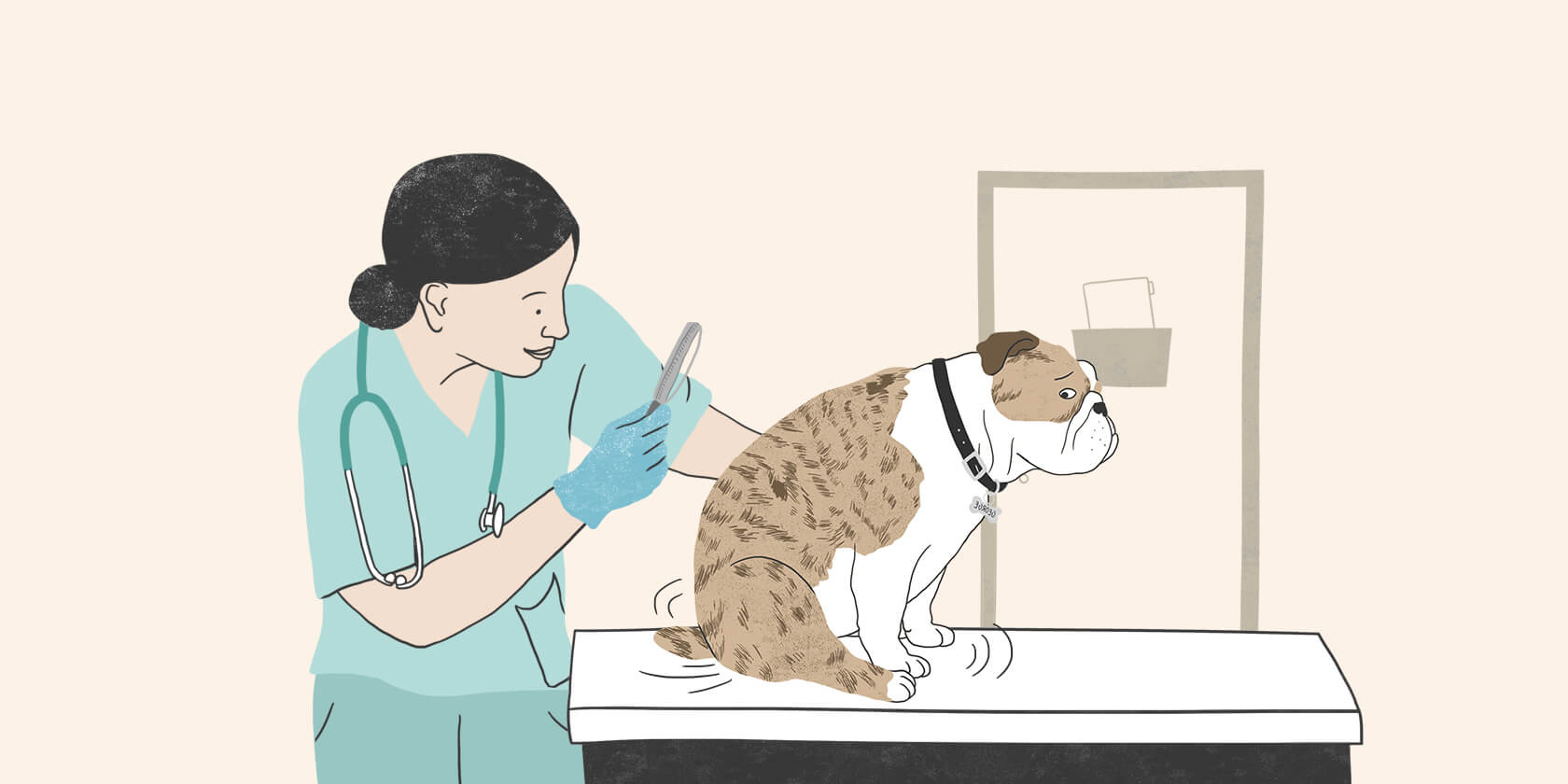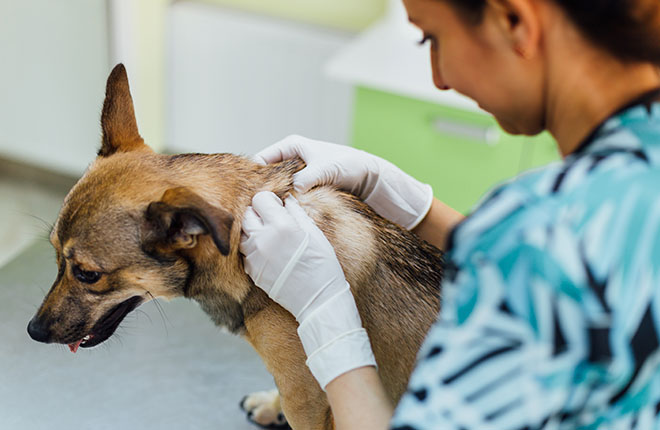Itchy dogs are a daily occurrence at veterinary offices around the world. It's an urgent problem that no dog wants to suffer with for long. In addition to causing discomfort for the dog, listening to constant scratching and licking can be a major stress for their human counterparts, too. Did you know ~9.6 million unique itchy dogs were treated by a veterinarian in 20221? In fact, skin allergies were the #1 reason for vet visits for dogs in 2022, for the eleventh year in row2. Once you identify signs of itchy skin in your dog, you should contact your veterinarian and make an appointment to have your dog evaluated.

A Veterinary Visit for Your Itchy Dog
When you arrive for your dog's appointment, your veterinary technician/nurse will talk to you about many things, including your pet's signs, medications, and home information. Be prepared to answer questions like:
- When did you first notice your dog itching?
- Are they scratching all over or just certain areas?
- When was their last dose of flea/tick preventative, and what kind was it? (It may be helpful for you to bring the packaging if it's a product you purchased elsewhere.)
- When was their last bath?
- Are any other pets or people in your home itchy?
- What is your dog's current diet? (What do they eat throughout the day?)
- Are there any new food, treats, or other changes in their environment?
Your veterinarian will review these answers, along with your pet's complete medical history. They also will do a thorough physical exam, making sure to take a close look at the skin and fur. Special attention will be given to the ears, skin folds, feet, and nails. They'll check for signs of fleas, flea dirt, or hair loss that may signify the presence of parasites. Any obvious areas of redness, scaling, bumps and sores, or hair loss will be assessed.
Tests to Identify Your Pet's Itch
Based on your dog's physical exam, signs, and medical history, your veterinarian may recommend some tests.
Testing for Bacterial or Fungal (Yeast) Infections
Most skin and ear infections are secondary issues, with skin allergies being the most common underlying cause (less common are hormonal imbalances such as hypothyroidism). If your pet has itchy (or smelly) ears, a swab of wax or debris may be collected from their ears. Open wounds, yellow crusts, or red skin lesions may also need to be sampled. You may see your veterinarian lightly scrape the surface of your dog's skin, or even press a microscope slide, swab, or special tape up against your dog's skin.
These samples will be analyzed under a microscope to check for the presence of bacteria and/or yeast. In some cases, the samples may be sent to an outside laboratory to identify the exact type of bacteria and what medications are best to use for treatment, especially if there is a resistant infection.
Testing for Parasites and Other Infections
In the case of suspected mange (parasitic skin condition) or ringworm (fungal skin infection), your pet may need to have slightly more invasive testing like a fungal hair culture or a skin scraping. A fungal hair culture involves plucking hair from very specific areas of the skin lesions. A skin scraping gently removes a little of the top layer of skin and can check for parasites in the skin. Most dogs do just fine with this, especially if they're getting treats or belly rubs at the same time! Your veterinarian may also pluck hairs from areas with the skin lesions to check for certain parasites.
Sometimes these initial in-house tests don’t provide the answers we’re looking for to diagnose your dog. At this point, your veterinarian may recommend more advanced testing like blood testing to rule out any other conditions (such as hypothyroidism). These tests are often sent out to other labs and may take 1–2 weeks to get results. A diet trial for up to 2 months may be needed for a food allergy diagnosis. A skin biopsy may be helpful to confirm the diagnosis of an allergy or infection, or uncover less common skin diseases.
Results & Initial Treatment Plan
When your veterinarian determines the underlying cause of your pet's itching, they'll create an initial treatment plan. This may include oral or injectable anti–itch allergy medications, oral and/or topical antibacterial and antifungal therapies, supplements, medicated shampoos, or special diets.
Even if your veterinarian can't finalize your pet's diagnostic results at the time of your visit, they'll still provide treatment for the itch right away. These treatments can help break the cycle of itch and give your dog (and you) some relief while you’re waiting on test results or next steps.
When is a Specialist Needed?
Occasionally, when advanced skin allergies, resistant infections, or otherwise complicated cases are present, your veterinarian may recommend that you take your dog to a veterinary dermatologist — a board–certified specialist who has completed specialized training and has expertise in diagnosing and treating skin diseases in your dog. Your veterinary dermatologist will examine your dog and utilize the initial records and testing done by your veterinarian. They will share their report, findings, and recommendations with you and your veterinarian. In many cases, your veterinarian can resume ongoing maintenance for your dog's skin condition.
Ongoing Management for Itchy Dogs
Unfortunately, many causes of itching are chronic medical conditions that can't be cured and require lifelong monitoring and management. Luckily, your veterinary team is there to support you and your dog through this process. Your dog's veterinarian and veterinary technicians/nurses can help you best determine an ongoing schedule of medication and bathing, make nutritional recommendations for food and treats, and provide the best medical advice to make treatment easier for you and your dog. The entire veterinary team understands the unique challenges itchy skin presents and can help you maintain a consistent and effective treatment plan to keep your dog comfortable!
ZPC-00954R1
- Data on file. Kynetec/PetTrak US Pruritus MP Dashboard, 2022, Zoetis Services LLC.
- Nationwide, Dermatitis, otitis externa continue to top common conditions that prompt veterinary visits, April 13, 2023, Accessed May 17, 2023.



